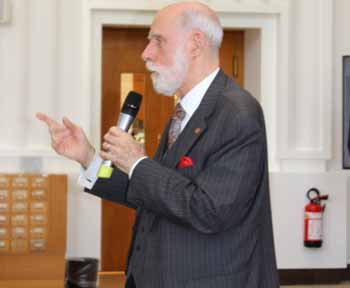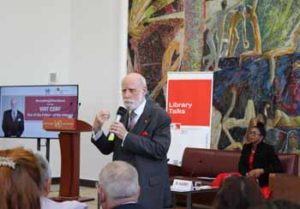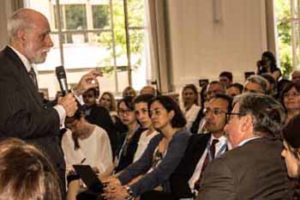
Interview with Vint Cerf, Chief Internet Evangelist and VP of Google by Marit Fosse
In early June this year, Francesco Pisano, the Director of the United Nations Library invited Mr Vinton G. Cerf, the vice president and chief internet promoter of Google to give a lecture during his visit to Geneva. Widely known as one of the « Fathers of the Internet », Mr Cerf is the co-designer of the TCP/IP protocols and the architecture of the Internet. He has served in executive positions at MCI, the Corporation for National Research Initiatives and the Defense Advanced Research Projects Agency and on the faculty of Stanford University. Mr Cerf is an active promoter and contributes to global policy development and continued spread of the Internet. What most people might not know is that he is also a fan of libraries and very concerned about how we can preserve documents and archives in this numeric age. We had a chance to meet with him, and now we will leave the floor to Mr Cerf…
Q: Mr. Cerf, could you tell us a little about yourself ?
I have been interested in science, mathematics and computers for a long time. When I was 10 years old I got a chemistry set and worked through all kinds of experiments. We even made nitroglycerin, which was stupid, but we did it anyway. Fortunately we did not blow anything up. I got fascinated by mathematics. I enjoyed doing algebra when I was in 5th grade, because I got more of the stuff. I was also fascinated by Scientific American, although I could not understand it at the depth I needed to. I was also interested in mechanical things. I used to take apart the vacuum cleaner and the washing machine then put them back together again. There was always a screw left over, which taught me about redundancy, but it seemed to work, so that was OK.
I was introduced to my first computer in 1958. It was tube-based machine, called Semi-Automated Ground Environment (SAGE). It was taking data from the distant early warning radars in Canada, transmitting them over telephone lines to Santa Monica in California, and analyzing them, figuring out whether the Russians were flying over the pole. We wanted to make sure that it could distinguish between Canadian geese flying over the pole or Russian bombers. I got fascinated by that.
In 1960 my best friend got access to a computer at UCLA while we were still in a high school. We were in the San Fernando Valley. So, I started working with computers in 1960 when I was 17 years old. I had jobs with a company called North American Aviation doing software programming in the summer. I took classes in computer science and mathematics at Stanford as an undergraduate and went to work for IBM in 1965 running a commercial time sharing system for them. It was in the very early days of commercial services. I went back to school for a PhD and enrolled at UCLA, as I realized that I needed to know more about computing, programming and operating system design etc. Although I started my training as a mathematician, I discovered that I’m really an engineer, as in problem resolutions, and I like to build things that work. While I was a graduate student as UCLA, I did a fairly substantial dissertation on an abstract topic, Scheduling Multiprocessing Systems. Most of my working time was on the Arkanet project later, so, I still consider myself as primarily in engineering not a theoretician. The theory underlies whatever I’m doing, but this is for understanding why it should work. But it’s making it work that is the important part, it’s getting it out there, and getting people to use it that are the most important things for me.
Q: How do you get the ideas ?
Remember, engineering thrives on problems that people draw your attention to. So, in the case of the Internet, Bob Kahn, my partner in this design, was the one who recognized the need for open networking with multiple networks, and that it would work. He is the one who conceived that idea. Since his background was not in software or operating systems, he got in touch with me when I was at Stanford, saying, “Here is this problem. Can we work together to solve it?” We did it in about six months and wrote a paper about it and published it in 1974, describing what the Internet protocols were, and how it would work. I had a graduate student’s team at Stamford doing the detail design of the TCP/IP protocols. By December 1974 we had published the first complete speck of the TCP protocol, and then we started implementing it in 1975. It was an international effort, so, we should keep in mind that it was not exclusively an American activity. In 1974, when I was at Stanford, I had researchers from Japan, Norway, France and colleagues from the U.K., and then eventually Germany and Italy. We were all part of this project so it was very international in character, even though it was driven by the US Defense Department, and the Defense Ministry in the UK was also very much part of it. By 1975, we were doing three separate independent implementations. Two in the U.S. and one in the U.K.. Then we discovered the mistakes, the protocol errors and so on, so, four times we iterated the design of the protocol. The forth version is the one you use now. It was essentially done in 1978.
By January 1983, we had implemented the protocol in about 30 different operative systems. We told everybody that it was either through the Arpanet or the other networks that they had to implement TCP/IP protocols by January 1983 or they were off the net. So, everybody did it. In 1983 we turned the Internet on. We had three networks working, and since then the Internet has been on with these three networks.
Of course, since then, a number of institutions have been created to promote the Internet and to continue the standardization, while other organizations have been working on planetary extensions which are not TCP/IP protocols, and we have had to invent a new set of protocols. Even that was inspired by problems that we can anticipate. What happens if we need networking in every space? We knew we were going to need it. We knew that we would need it not only for exploration, but we imagined what might happen 100 years from now if we actually had people on the Moon or Mars, or orbiting in the space in long-term facilities. How would they communicate with each other, and what would that look like? So, we did the design of the protocols on these presumptions that there would be a growing population of people and space craft needed to communicate locally and back to earth.
Q: Today we are in 2018. How do you see the future ?

photo credit UN Library Geneva
First of all, there is no doubt in my mind that communication is likely to be through the Internet – but it could be something new – and will be everywhere. Today, Wi-Fi is everywhere. Even in this building Wi-Fi is everywhere, so, networking is assumed to be the norm today. And we will be surprised when it is not available, when it’s not of good quality. That’s the one thing for sure.
Second thing, there will be billions of devices that will be programmable and able to communicate using the Internet. We are seeing examples of that, and they will create a lot of headaches, whether it’s bugs in the software or other problems. Eventually, we turn to computers and networks without even thinking that it’s a computer. Think about Google Home, Alexia. You see, they do not look like computers; they do not have keyboards, but they are something you interact with orally. Eventually those assistants at Google will be able to interact with them just like you and I right now, having a conversation or commanding, or we might be able to communicate in another way with these devices. You should be able to send an email to your assistant or call her on the phone and dictate something.
All those modalities that we use in working with people will also work for computers. I think that is a goal that many of us have for finding a way to make computers as easily dealt with as people are.
Q: It’s very interesting, but what will happen to the human beings ?
Well, a number of things. The trends are already clear. First of all, we will be instruments ourselves, more thoroughly. For example we’ll have devices in our body tracking state of health regularly, gathering data, analyzing them and possibly aggregating them. We can detect for example the beginning of an epidemic of some kind. I think also we’ll be personalizing ourselves, so, we’ll analyze a person’s metabolism and will be able to tell what is not functioning well, and even know what could be done. So, gathering data about ourselves I think would be quite normal, and to be expected. I hope it will improve our state of health as a result. The machine language translation is functioning so well that we could have a conversation where I speak English and you speak French and get it translated in real time.
I saw a Chinese-English translation device when I was in Shanghai recently. I would speak English, and the machine translated it into Chinese, and they also had a person speaking Chinese, and the machine translated it into English. We did it live, in front of people where none of us had practiced the phrases. It actually worked very well.
Q: People say about artificial intelligence that the machines will become so powerful that they will take over. What do you think about this ?
I know these scary arguments that machines can work better that we can, that they will get better with everything, and the machines will replace us. I’m not of that persuasion. I think that with these tools we will get better and better at improving our abilities and making use of the tools: getting work done more quickly, making better decisions, analyzing things more thoroughly. I see this as a tool-building exercise, not as a threat.
It is true that jobs will go away, but new jobs will be created. The challenge is: how do we reskill people whose jobs are taken away ? We need to encourage people willing to do that, and this is the reason why kids should be taught new things. Thus, when their jobs end, they are capable of learning something new.
Q: You are very inspiring person to listen to. What is the main message for the future generation ?
Well, I have several things. First of all, when you are young it’s OK to take risk. So don’t be too cautious. You can always recover from business failure or something like that. Second, I would say, learn how to think critically and analytically. It’s very useful. Third, I would say that you really need to express your ideas articulately to other people if you want to accomplish anything big. So, you have to learn how to sell your ideas to people. I have learned that more than once. I guess I would encourage them to write software just because the critical thinking that goes into writing software is a good exercise.
I would say that patience and persistence are two very important things if you would like to get significant work done. Sometimes it takes a long time for some changes to take place, so it’s important not to give up.

photo credit UN Library Geneva
Q: And finally, for the diplomatic community in Geneva, what would you say for them? What kind of advice would you give to these people ?
Well I would say that the Internet and the various devices are going to be part of daily life whether you like it or not. Secondly, international implications of these devices will be exported across national boundaries, so, we need to agree how we do law enforcement under those circumstances. Interpol is an example of this. We all have to agree that there are abuses that take place in the network, and we might agree collectively that the abuses are unacceptable and reject that kind of behavior. So, I think people should grow up unafraid of the Internet but see it as a tool for connecting with other people, for pursuing objectives that can be accomplished within the environment, to make use of it and to add to the Internet.





